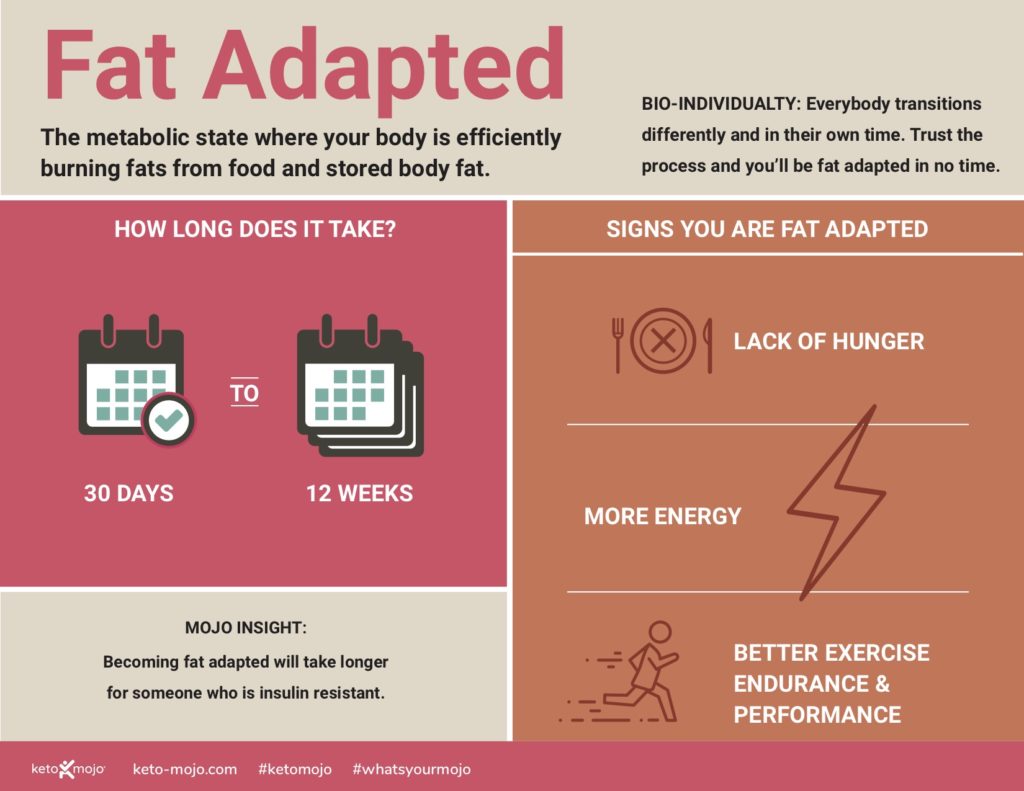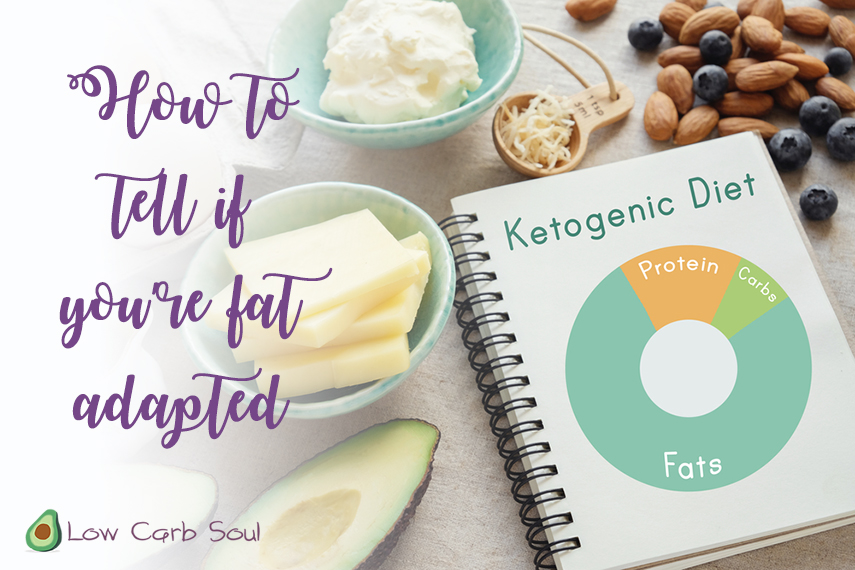How To Get Fat Adapted Quickly

The quest for optimal health and performance has led many to explore the potential benefits of fat adaptation. This metabolic shift, where the body primarily uses fat for fuel instead of carbohydrates, promises enhanced energy levels, improved athletic endurance, and even weight management advantages. However, the journey to becoming fat-adapted can be challenging, often accompanied by the dreaded "keto flu" and feelings of fatigue.
This article delves into the strategies and methodologies individuals can employ to accelerate their transition to fat adaptation safely and effectively. We'll explore the science behind this metabolic shift, examine practical dietary and lifestyle modifications, and highlight potential pitfalls to avoid along the way. Our goal is to provide a comprehensive guide, empowering readers with the knowledge to achieve fat adaptation with minimal discomfort and maximum success.
Understanding Fat Adaptation: The Science
Fat adaptation, also known as keto-adaptation, refers to the body's ability to efficiently utilize fat as its primary energy source. This process involves a series of physiological changes, including increased fat oxidation, enhanced mitochondrial function, and improved insulin sensitivity.
When carbohydrate intake is significantly reduced, the body is forced to tap into its fat reserves for energy. This triggers the liver to produce ketone bodies, which serve as an alternative fuel source for the brain and other tissues.
The transition is not instantaneous; it typically takes several weeks to become fully fat-adapted. The speed and ease of this transition can vary significantly depending on factors such as individual metabolism, activity level, and dietary habits.
Dietary Strategies for Rapid Fat Adaptation
The Ketogenic Diet: A Foundation
The cornerstone of fat adaptation is the ketogenic diet, characterized by very low carbohydrate intake, moderate protein intake, and high fat intake. This macronutrient ratio typically translates to roughly 70-80% of calories from fat, 20-25% from protein, and 5-10% from carbohydrates.
Focus on consuming healthy fats from sources such as avocados, nuts, seeds, olive oil, and fatty fish. Limit processed foods and refined carbohydrates, including sugary drinks, bread, and pasta.
Careful planning and tracking of macronutrient intake are crucial for ensuring adherence to the ketogenic diet and promoting rapid fat adaptation.
Intermittent Fasting: Amplifying the Effect
Intermittent fasting (IF) can further accelerate the process of fat adaptation. By extending periods without food, the body is forced to rely more heavily on stored fat for energy.
Popular IF protocols include the 16/8 method (fasting for 16 hours and eating within an 8-hour window) and the 5:2 diet (eating normally for five days and restricting calories to 500-600 for two days).
When combined with a ketogenic diet, IF can create a synergistic effect, promoting both fat oxidation and ketone production.
Electrolyte Management: Mitigating the "Keto Flu"
The "keto flu" is a common side effect of transitioning to a ketogenic diet, characterized by fatigue, headaches, and muscle cramps. This is largely due to the loss of electrolytes, particularly sodium, potassium, and magnesium, as the body adapts to burning fat.
Supplementing with electrolytes or increasing the consumption of electrolyte-rich foods, such as leafy greens and bone broth, can help alleviate these symptoms and facilitate a smoother transition.
Pay close attention to your body's signals and adjust electrolyte intake accordingly to maintain optimal hydration and mineral balance.
Lifestyle Factors: Optimizing the Environment
Exercise: Enhancing Metabolic Flexibility
Regular physical activity plays a crucial role in enhancing metabolic flexibility, the body's ability to switch efficiently between using carbohydrates and fat for fuel. Both aerobic and resistance training can contribute to this adaptation.
Low-intensity exercise, such as walking or jogging, is particularly effective for promoting fat oxidation. High-intensity interval training (HIIT) can also be beneficial for improving insulin sensitivity and overall metabolic health.
Listen to your body and avoid overtraining, which can hinder the adaptation process and increase the risk of injury.
Sleep: Supporting Hormonal Balance
Adequate sleep is essential for regulating hormones that influence metabolism and energy expenditure. Lack of sleep can disrupt hormone balance, leading to increased cravings, decreased fat burning, and impaired glucose control.
Aim for 7-9 hours of quality sleep per night to support optimal metabolic function and facilitate fat adaptation.
Establish a consistent sleep schedule and create a relaxing bedtime routine to promote restful sleep.
Stress Management: Minimizing Cortisol's Impact
Chronic stress can elevate cortisol levels, which can interfere with fat adaptation by promoting glucose production and inhibiting fat burning. Implement stress management techniques, such as meditation, yoga, or spending time in nature.
Mindfulness practices can help reduce stress and improve overall well-being. Prioritize activities that bring you joy and relaxation to minimize the negative impact of stress on your metabolism.
Seeking support from friends, family, or a therapist can also be helpful for managing stress and promoting emotional well-being.
Potential Pitfalls and Considerations
While fat adaptation offers numerous potential benefits, it's crucial to be aware of potential pitfalls. Consulting with a healthcare professional or a registered dietitian is recommended, especially for individuals with pre-existing health conditions.
Some individuals may experience nutrient deficiencies on a ketogenic diet if it is not properly planned. Ensure adequate intake of essential vitamins and minerals through food or supplementation.
It's important to note that fat adaptation may not be suitable for everyone. Certain medical conditions, such as kidney disease or pancreatitis, may contraindicate a ketogenic diet.
The Future of Fat Adaptation Research
Ongoing research is continually expanding our understanding of fat adaptation and its potential applications. Studies are exploring its impact on various health conditions, including diabetes, epilepsy, and neurodegenerative diseases.
The development of personalized dietary strategies based on individual genetic and metabolic profiles holds promise for optimizing the fat adaptation process. Further research is needed to identify biomarkers that can accurately predict an individual's response to a ketogenic diet and inform personalized recommendations.
As our understanding of fat adaptation evolves, it is likely to play an increasingly important role in the prevention and management of chronic diseases and the optimization of human performance.
Ultimately, successful fat adaptation requires a holistic approach that encompasses dietary modifications, lifestyle adjustments, and a commitment to continuous learning and self-monitoring. By carefully considering the information presented and seeking professional guidance when needed, individuals can navigate the transition to fat adaptation safely and effectively, unlocking the potential benefits of this metabolic shift.


















